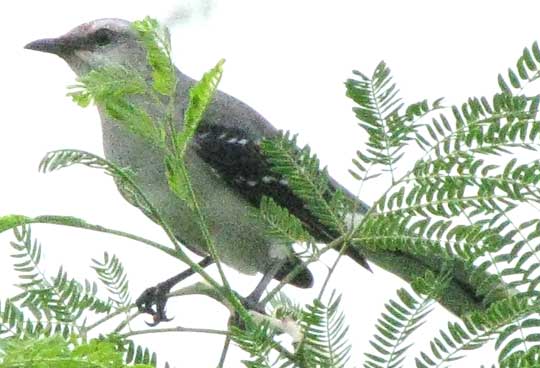Excerpts from Jim Conrad's
Naturalist Newsletter
from the February 25, 2008 Newsletter written in the community of 28 de Junio, in the Central Valley 8 kms west of Pujiltic, elev. ~700m (2300ft), ~N16.331°, ~W92.472°; southeastern Chiapas state, MÉXICO
CENZONTLE THE TROPICAL MOCKINGBIRD
This week for an hour or two each morning a mockingbird sang somewhere in the scrub behind my dwelling. What a pleasure hearing his easy-going discourses, each phrase repeated three or four times. He didn't sing as loudly and with such urgency as he'll sing later when the rainy season begins. The impression is that this is warming-up singing, practice for later when he'll sing hard, all day long, day after day.

Though his calling seems identical to what I grew up hearing in Kentucky, here the mockingbird species we have is the Tropical Mockingbird, MIMUS GILVUS, not the Northern Mockingbird, Mimus polyglottos, which is North America's mocker. The Northern Mockingbird reaches as far south as Mexico's Isthmus of Tehuantepec, but then on this side of the Isthmus Tropical Mockingbirds take over. There's a tiny bit of overlap in their distributions at the Isthmus, and even some hybridization.
The most obvious visual difference between the two species is that the Northern Mockingbird not only has white wingbars, but also a large patch of white on each wing, below the wingbars. In the above picture you can see that our Tropical Mockingbirds' lack those big white wing-patches. If I were taxonomy king of the world I'm not sure I'd keep the two species separate based on such modest differences. However, Howell maintains the two species apart in his masterpiece, and I'm not about to argue with him. Some experts do lump them, though.
Tropical Mockingbirds are distributed as far south as Honduras, plus there're found here and there in the Caribbean. Many Mexicans keep them in little cages on their patios where they do sing gloriously, but look dirty, haggard and profoundly unhappy.
Mexicans call both species Cenzontle. That name looks like a Nahuatl word to me, Nahuatl being spoken by the ancient Aztecs. "Cenzontle" is such a pretty word that it makes our "bird-who-mocks" name seem rather uninspired by comparison. I wouldn't be surprised, though, if it turned out that in Nahuatl "Cenzontle" means something like "bird-who-mocks."